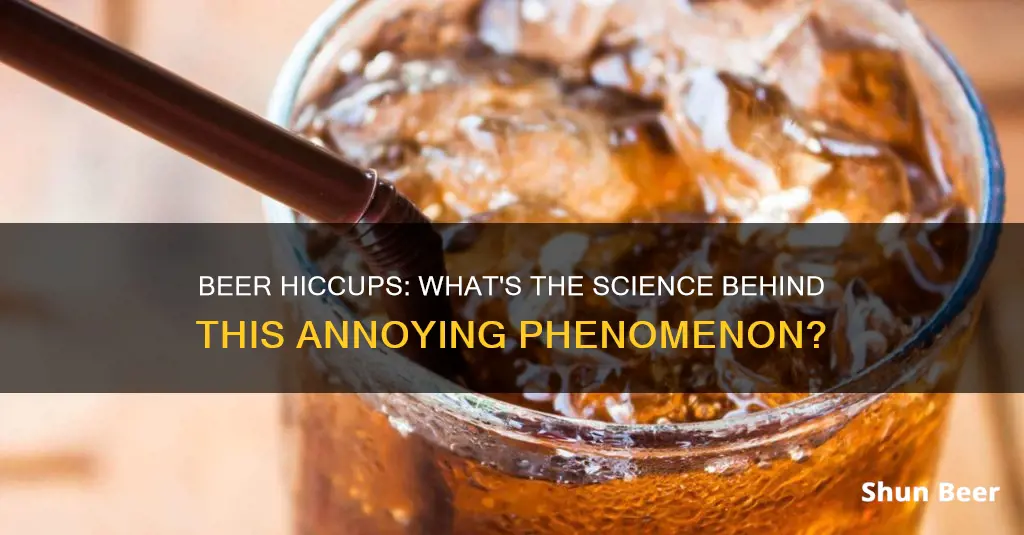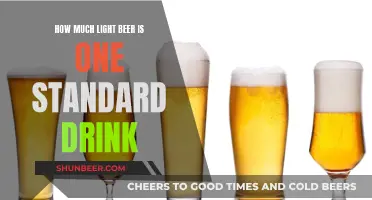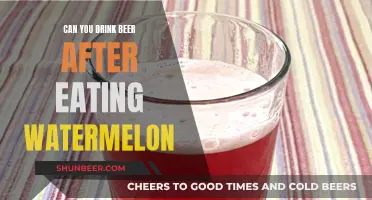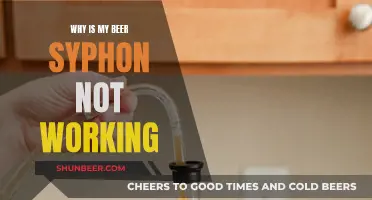
Hiccups are involuntary contractions of the diaphragm muscle, which is responsible for controlling breathing. When drinking alcohol, several factors can trigger these spasms, including irritation of the phrenic nerve, changes in carbon dioxide levels, gastroesophageal reflux, and stimulation of the vagus nerve. Alcohol can irritate the nerves controlling the diaphragm, including the phrenic nerve, leading to spasms and hiccups. Beer, in particular, is notorious for causing hiccups due to its carbonation, which distends the stomach and increases pressure on the diaphragm. Additionally, drinking alcohol rapidly or in large quantities can irritate the stomach lining and esophagus, triggering the hiccup reflex. While drunk hiccups are typically harmless and temporary, they can be bothersome and may indicate an underlying health condition in rare cases.
| Characteristics | Values |
|---|---|
| Cause of hiccups | Involuntary contraction of the diaphragm muscle |
| Effect of alcohol on hiccups | Alcohol can irritate the nerves that control the diaphragm, including the phrenic nerve and the vagus nerve |
| Effect of alcohol on the body | Alcohol is a central nervous system depressant that can alter the normal functioning of nerve cells and cause muscles in the body to relax |
| Effect of alcohol on the stomach | Alcohol can irritate the stomach lining and increase the production of stomach acid |
| Effect of alcohol on the esophagus | Alcohol can relax the muscles of the esophagus and increase the production of stomach acid, leading to acid reflux |
| Effect of drinking speed on hiccups | Drinking too quickly can cause swallowing of more air, which can irritate the diaphragm muscle and lead to hiccups |
| Effect of drink type on hiccups | Carbonated or sugary drinks may increase the likelihood of experiencing hiccups |
| Effect of drinking on the vagus nerve | Drinking water or non-alcoholic beverages can help stimulate the vagus nerve, which plays a role in controlling hiccups |
| Remedies for hiccups | Holding breath, drinking water, breathing techniques, gargling with ice water, biting on a slice of lemon, etc. |
What You'll Learn

Irritation of the phrenic nerve
Drinking alcohol can irritate the phrenic nerve, which controls the diaphragm. This irritation can lead to spasms and hiccups. Alcohol is a central nervous system depressant that can alter the functioning of nerve cells and cause the muscles in the body to relax, including the diaphragm muscle.
The diaphragm is the muscle just under the lungs that separates the abdomen from the chest. Hiccups are caused by a sudden contraction of the diaphragm, which leads to the muscles in the chest and abdomen shaking and the glottis closing, resulting in the characteristic 'hic' sound.
The exact mechanism through which alcohol triggers hiccups is not fully understood. However, one theory suggests that the relaxation of the diaphragm muscle caused by alcohol may irritate the phrenic nerves, resulting in spasmodic contractions and hiccups.
Hiccups when drunk are typically temporary and subside as the effects of alcohol wear off. However, persistent hiccups that last longer than 48 hours could indicate an underlying health issue such as gastroesophageal reflux (GERD), nerve damage, or a tumour.
Beer Math: Standard Drinks Per Liter Explained
You may want to see also

Changes in carbon dioxide levels
Drinking beer and other alcoholic beverages can lead to hiccups due to several factors, one of which is the change in carbon dioxide levels in the body.
Alcohol consumption can affect the levels of carbon dioxide in the body. Increased levels of carbon dioxide can stimulate the diaphragm, leading to hiccups. This increase in carbon dioxide may be due to the carbonation in beer and other fizzy alcoholic drinks. The gas in these drinks can cause the stomach to expand, putting pressure on the diaphragm and potentially triggering the hiccup reflex.
Additionally, the rapid temperature change from consuming a cold drink can also trigger hiccups. The sudden temperature change can shock the vagus nerve, disrupting and resetting its current activity pattern. This is why drinking cold water is often recommended as a remedy for hiccups.
Furthermore, drinking too quickly or consuming large amounts of alcohol can also contribute to hiccups. This behaviour can lead to bloating and distension of the stomach, which can irritate the diaphragm and surrounding nerves, increasing the likelihood of hiccups.
While hiccups are usually harmless and temporary, they can be bothersome and inconvenient, especially when drinking. To prevent hiccups while drinking beer, it is advisable to consume alcohol in moderation and opt for non-carbonated drinks.
Beer and Surgery: What's the Safe Timeline?
You may want to see also

Gastroesophageal reflux
Alcohol consumption can increase the production of stomach acid, which can lead to acid reflux. This refluxed acid can irritate the diaphragm, causing it to contract involuntarily and resulting in hiccups. The irritation of the diaphragm can also be caused by the increased production of gastric acid, which is stimulated by alcohol.
Drinking large amounts of liquid, especially beer and carbonated beverages, can cause the stomach to swell and put pressure on the diaphragm, which may trigger hiccups. Alcohol is also an irritant to the digestive system, including the oesophagus, which can further contribute to hiccups.
Beer and the Gym: Is It a Good Mix?
You may want to see also

Stimulation of the vagus nerve
The vagus nerve is a significant component of the hiccup reflex arc, which includes the afferent and efferent limbs and a central connection. The afferent limb is made up of the vagus and phrenic nerves, while the efferent pathway is formed by the phrenic nerve, which stimulates the diaphragm. The vagus nerve is also involved in regulating various bodily functions, including digestion.
When the vagus nerve is stimulated, it can trigger a hiccup reflex. Alcohol consumption can irritate the nerves that control the diaphragm, including the vagus nerve, leading to spasms and hiccups. This irritation can be caused by the direct effect of alcohol on the nerve or by the increased production of stomach acid due to alcohol relaxing the muscles of the esophagus. This increased acid production can lead to acid reflux, further irritating the diaphragm and triggering hiccups.
While the exact mechanism of alcohol-induced hiccups is not fully understood, it is believed that alcohol interferes with the normal functioning of the diaphragm and its coordination with the respiratory system. This interference may be due to the relaxing effect of alcohol on the diaphragm muscle or the increased production of gastric acid.
To alleviate hiccups caused by vagus nerve stimulation, drinking water or non-alcoholic beverages can help. This is because water or non-alcoholic beverages can stimulate the vagus nerve, potentially interrupting the hiccup reflex. However, it is important to avoid carbonated or fizzy drinks as they can aggravate hiccups.
In rare cases of intractable hiccups, medical professionals may consider vagus nerve stimulation (VNS) as a novel surgical treatment option. VNS has been used successfully in a few cases, but it is not a guaranteed cure and further research is needed.
Beer and Zoloft: Is It Safe to Mix?
You may want to see also

Irritation of the stomach and oesophagus
Alcohol can increase the production of stomach acid and relax the oesophageal sphincter muscle, which separates the stomach from the oesophagus. This relaxation allows stomach acid to flow back up into the oesophagus, causing irritation and spasms that can trigger hiccups. Additionally, the carbonation in beer can cause the stomach to expand, putting pressure on the diaphragm and increasing the likelihood of hiccups.
Furthermore, drinking alcohol can impact our breathing patterns. It can slow down our respiratory rate and deepen our breaths. These changes in breathing patterns may also contribute to the occurrence of hiccups.
To prevent hiccups while drinking beer, it is recommended to drink slowly, avoid carbonated drinks, and eat before drinking to reduce the speed of alcohol absorption and minimise irritation of the stomach and oesophagus.
PRP Recovery: Can You Drink Beer Post-Procedure?
You may want to see also
Frequently asked questions
Drinking beer can cause your stomach to distend or expand, which puts pressure on your diaphragm and can lead to hiccups. Beer is often carbonated, and the gas in carbonated drinks can also cause your stomach to expand.
A hiccup is an involuntary contraction or spasm of the diaphragm, which is the muscle that pumps your lungs so you can breathe. When the diaphragm contracts, it causes a rush of air into the lungs, which then closes the vocal cords, producing the "hic" sound.
Yes, alcohol can irritate the nerves that control the diaphragm, including the phrenic nerve and the vagus nerve. Alcohol can also irritate the lining of the oesophagus and stomach, causing spasms that can trigger hiccups.
Hiccups usually go away on their own within a few minutes to an hour. However, if you want to get rid of them faster, you can try holding your breath, drinking a glass of water, or breathing into a paper bag.







